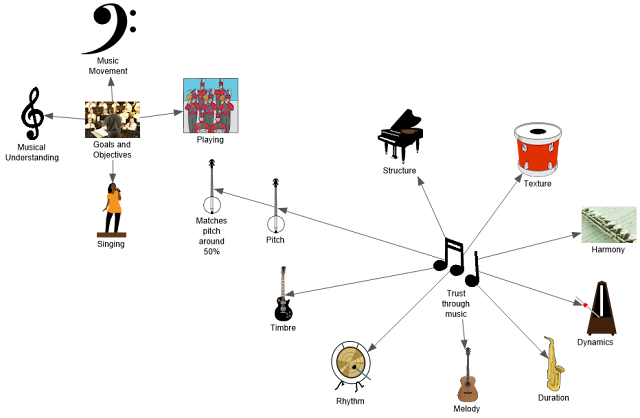Synthesis Sunday: Trust in Music, Therapy, and Early Childhood: A Developmental Approach
Last week's chapter in Music, Therapy, and Early Childhood: A Developmental Approach by Elizabeth Schwartz addressed awareness and the reflex phase of musical development on the Briggs/Bruscia stages of musical development. This week's chapter, Chapter 8, addresses the concepts of trust and the Briggs/Bruscia stage of reflexive child to intention child.
Schwartz continues to delineate the different elements of this idea through the musical elements of pitch, timbre, rhythm, melody, harmony, dynamics, texture, and structure. This format assists me in my work with persons who had developmental interruptions at some point. Some of my older clients are in this stage - they all pass through that stage to some extent as we are building our own therapeutic relationships.
I'm starting a visual for myself - something to help me figure out all of this and how it works in my mind and in Beth's mind as well. Here's a glimpse into the first part of this visual:
This is definitely a work in progress, but I think it will help me further understand how all of this works within my model of music therapy work with my clients, as well as how Beth thinks about it and how Briggs and Bruscia organize the thoughts of development in and through music. Eventually, all of the different elements of music will include all of the characteristics present in the book and in my mind. This will not be done quickly, but it will get done at some point.
One of the things that I really like about this text is that it is organized the way I think - I started focusing on the different elements of music that I use during music therapy sessions before this book was published, and it was wonderful to find that other people thought the same way I thought about music. For me, this brings my ideas about session strategizing, and assessment, and treatment planning to a logical, organized end, and I know that there is at least one more music therapist out there who thinks the same way I do about these things. That is so important in this often isolating profession. I'm not alone!!
Next week may be taken up with Chapter 9 or with more of this visual. I'm not sure yet...
Thanks for reading!!
Schwartz, E. (2008). Music, therapy, and early childhood: A developmental approach. Gilsum, NH: Barcelona Publishers.
"Trust is the structuring and organization of response to awareness" (p.59).For my clients, this idea is manifested through the development of the therapeutic relationship as well as through the concepts of music itself. This is one of the reasons that I use opening TMEs as part of my session planning and strategizing. I know there are many people who think that singing an opening song is inappropriate, but I find that my clients respond to that familiar process and often protest when it doesn't happen. There is trust there - trust that I know the process that they expect and that I will support them in their process through and with the music we share with each other.
Schwartz continues to delineate the different elements of this idea through the musical elements of pitch, timbre, rhythm, melody, harmony, dynamics, texture, and structure. This format assists me in my work with persons who had developmental interruptions at some point. Some of my older clients are in this stage - they all pass through that stage to some extent as we are building our own therapeutic relationships.
I'm starting a visual for myself - something to help me figure out all of this and how it works in my mind and in Beth's mind as well. Here's a glimpse into the first part of this visual:
This is definitely a work in progress, but I think it will help me further understand how all of this works within my model of music therapy work with my clients, as well as how Beth thinks about it and how Briggs and Bruscia organize the thoughts of development in and through music. Eventually, all of the different elements of music will include all of the characteristics present in the book and in my mind. This will not be done quickly, but it will get done at some point.
One of the things that I really like about this text is that it is organized the way I think - I started focusing on the different elements of music that I use during music therapy sessions before this book was published, and it was wonderful to find that other people thought the same way I thought about music. For me, this brings my ideas about session strategizing, and assessment, and treatment planning to a logical, organized end, and I know that there is at least one more music therapist out there who thinks the same way I do about these things. That is so important in this often isolating profession. I'm not alone!!
Next week may be taken up with Chapter 9 or with more of this visual. I'm not sure yet...
Thanks for reading!!
Schwartz, E. (2008). Music, therapy, and early childhood: A developmental approach. Gilsum, NH: Barcelona Publishers.



Comments
Post a Comment